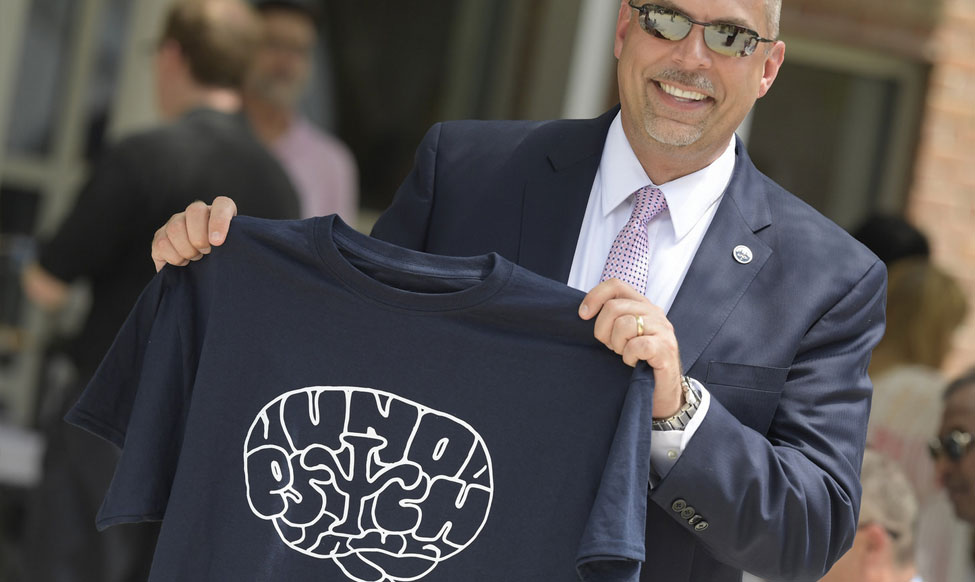About the Program
The overall training goal of the department's graduate program is to produce well-trained applied scientists who, depending on their career goals, are capable of assisting clinical psychologists and working as a mental health professional (MS objective) or teaching, conducting research, and providing professional service delivery (Ph.D. objective). Regardless of the degree objective, students have substantial contact with faculty through classes, graduate committees, and other formal and informal departmental activities. The size and collaborative nature of our faculty ensures that students will have the opportunity to interact with nearly all of the faculty members in the department. We offer a Master of Science and a Doctorate of Philosophy in Applied Psychology. Students may apply for either the MS in psychology or the Ph.D. in psychology program. Both MS and PhD students will earn a MS degree, however the terminal MS students do not complete a thesis. Students applying to the Ph.D. program will choose one of two areas of concentration, Applied Developmental Psychology or Applied Biopsychology.
Elliott Beaton, Ph.D.
Graduate Coordinator
Ph.D Program Director
Phone: 504-280-6763
ebeaton@uno.edu
Tracey Knaus, Ph.D.
M.S. Program Director
Phone: 504-280-6765
taknaus@uno.edu
Master of Science in Applied Psychology
Student Learning Outcomes
Student Learning Outcomes specify what students will know, be able to do, or be able to demonstrate when they have completed a program of study.
Degree Requirements
A minimum of 30 credit hours is necessary for the Master of Science degree, although some students may be required to take additional hours to remedy undergraduate training deficiencies or in order to meet particular career goals. Students may complete the M.S. while in progress towards the Ph.D. at UNO or as a terminal degree.
- General Core: Core courses are required for all graduate students. They include Psychology 6311, 6050, 6091 (two credit hours), 6350, and 6550.
- Specialty Core: Each specialization or concentration requires the following as core:
Applied Developmental Psychology with Ph.D. objective: PSYC 6312 (3 hrs), 6101 (3 hrs), 6102 (3 hrs), 6091 (2 hrs), and 6610 (3 hrs).
Applied Biopsychology with a Ph.D. objective: PSYC 6312 (3 hrs), 6091 (2 hrs), 6801 (3 hrs), 6802 (3 hrs), and 6810 (3 hrs).
Non-thesis Applied M.S. objective: PSYC 6620 (3 hrs), 6170 (3 hrs), 6101 (3 hrs), 6102 (3 hrs), 6610 (3 hrs). Students pursuing the M.S. as a terminal degree will complete two sections of practicum, PSYC 6191.
Doctor of Philosophy in Applied Psychology
The overall training goal of the department’s doctoral program is to produce well-trained applied scientists who, depending on their career goals, are capable of teaching, conducting research, and providing professional service delivery. Students have substantial contact with faculty in both programs through classes, graduate committees, and other formal and informal departmental activities. The size and collaborative nature of our faculty ensures that students will have the opportunity to interact with nearly all of the faculty members in the department. Students in both programs take many classes together and often work on joint research projects.
This doctoral degree program, combined with a master of science, offers two specializations.
Student Learning Outcomes
Student Learning Outcomes specify what students will know, be able to do, or be able to demonstrate when they have completed a program of study.
Specializations
Applied Biopsychology Program
Biopsychology is a translational, integrative, and rapidly evolving discipline within psychology that can be defined as the scientific study of the biology of behavior. The Applied Biopsychology track at UNO is personified by collaborative faculty research in biopsychology research laboratories.
Learn more about Applied Biopsychology specialization
Applied Developmental Psychology Program
Applied Developmental Psychology focuses on the use of developmental theory and research to promote positive developmental outcomes in individuals, families, and communities. Students are trained to use science-based knowledge to promote healthy behavioral, social, cognitive, emotional, and biological development.
Learn more about Applied Developmental Psychology specialization
Next Step: How to Apply
Application Information for the Applied Psychology Program


